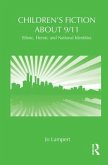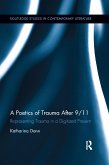Literature after 9/11
Herausgeber: Keniston, Ann; Quinn, Jeanne Follansbee
Literature after 9/11
Herausgeber: Keniston, Ann; Quinn, Jeanne Follansbee
- Broschiertes Buch
- Merkliste
- Auf die Merkliste
- Bewerten Bewerten
- Teilen
- Produkt teilen
- Produkterinnerung
- Produkterinnerung
Drawing on trauma theory, genre theory, political theory, and theories of postmodernity, space, and temporality, Literature After 9/11 suggests ways that these often distinct discourses can be recombined and set into dialogue with one another as it explores 9/11's effects on literature and literature's attempts to convey 9/11.
Andere Kunden interessierten sich auch für
![Children's Fiction about 9/11 Children's Fiction about 9/11]() Jo LampertChildren's Fiction about 9/1168,99 €
Jo LampertChildren's Fiction about 9/1168,99 €![A Poetics of Trauma after 9/11 A Poetics of Trauma after 9/11]() Katharina DonnA Poetics of Trauma after 9/1159,99 €
Katharina DonnA Poetics of Trauma after 9/1159,99 €![The Forum; Volume 11 The Forum; Volume 11]() AnonymousThe Forum; Volume 1133,99 €
AnonymousThe Forum; Volume 1133,99 €![The 9/11 Novel The 9/11 Novel]() Arin KeebleThe 9/11 Novel47,99 €
Arin KeebleThe 9/11 Novel47,99 €![Codex Junius 11 Codex Junius 11]() UnknownCodex Junius 1117,99 €
UnknownCodex Junius 1117,99 €![The Post-9/11 City in Novels The Post-9/11 City in Novels]() Karolina GolimowskaThe Post-9/11 City in Novels48,99 €
Karolina GolimowskaThe Post-9/11 City in Novels48,99 €![Feminist Readings in Middle English Literature Feminist Readings in Middle English Literature]() Ruth Evans (ed.)Feminist Readings in Middle English Literature56,99 €
Ruth Evans (ed.)Feminist Readings in Middle English Literature56,99 €-
-
-
Drawing on trauma theory, genre theory, political theory, and theories of postmodernity, space, and temporality, Literature After 9/11 suggests ways that these often distinct discourses can be recombined and set into dialogue with one another as it explores 9/11's effects on literature and literature's attempts to convey 9/11.
Hinweis: Dieser Artikel kann nur an eine deutsche Lieferadresse ausgeliefert werden.
Hinweis: Dieser Artikel kann nur an eine deutsche Lieferadresse ausgeliefert werden.
Produktdetails
- Produktdetails
- Verlag: Routledge
- Seitenzahl: 316
- Erscheinungstermin: 7. Juni 2010
- Englisch
- Abmessung: 229mm x 152mm x 17mm
- Gewicht: 460g
- ISBN-13: 9780415883986
- ISBN-10: 0415883989
- Artikelnr.: 30362125
- Herstellerkennzeichnung
- Libri GmbH
- Europaallee 1
- 36244 Bad Hersfeld
- gpsr@libri.de
- Verlag: Routledge
- Seitenzahl: 316
- Erscheinungstermin: 7. Juni 2010
- Englisch
- Abmessung: 229mm x 152mm x 17mm
- Gewicht: 460g
- ISBN-13: 9780415883986
- ISBN-10: 0415883989
- Artikelnr.: 30362125
- Herstellerkennzeichnung
- Libri GmbH
- Europaallee 1
- 36244 Bad Hersfeld
- gpsr@libri.de
Ann Keniston is an assistant professor of English at the University of Nevada-Reno, and is the author of Overheard Voices: Address and Subjectivity in Postmodern American Poetry (Routledge 2006), and a poetry collection, The Caution of Human Gestures (David Robert, 2005). Jeanne Follansbee Quinn is director of studies for the Program in History and Literature at Harvard University and has published essays on James Agee and Walker Evans, Richard Wright and American pragmatism. She is completing a book on anti-fascist aesthetics in the United States during the 1930s, Democratic Aesthetics: Popular Front Anti-Fascism.
Acknowledgments
Introduction: "Representing 9/11: Literature and Resistance," Ann Keniston
and Jeanne Follansbee Quinn
Part One: Experiencing 9/11: Time, Trauma, and the Incommensurable Event
Chapter 1: "Portraits of Grief: Telling Details and the New Genres of
Testimony," Nancy K. Miller
Chapter 2: "Foer, Spiegelman, and 9/11's Timely Traumas," Mitchum Huehls
Chapter 3: "Graphic Implosion: Politics, Time, and Value in Post-9/11
Comics," Simon Cooper and Paul Atkinson
Chapter 4: "'Sometimes Things Disappear': Absence and Mutability in Colson
Whitehead's The Colossus of New York," Stephanie Li
Chapter 5: "Witnessing 9/11: Art Spiegelman and the Persistence of Trauma,"
Richard Glejzer
Part Two: 9/11 Politics and Representation
Chapter 6: "Seeing Terror, Feeling Art: Public and Private in Post-9/11
Literature," Michael Rothberg
Chapter 7: "'We're not a friggin' girl band': September 11, Masculinity,
and the British-American Relationship in David Hare's Stuff Happens and Ian
McEwan's Saturday," Rebecca Carpenter
Chapter 8: "'We're the culture that cried wolf': Discourse and Terrorism in
Chuck Palahniuk's Lullaby," Lance Allen Rubin
Chapter 9: "Still Life: 9/11's Falling Bodies," Laura Frost
Part Three: 9/11 and the Literary Tradition
Chapter 10: "Telling It Like It Isn't," David Simpson
Chapter 11: "Portraits 9/11/01: The New York Times and the Pornography of
Grief," Simon Stow
Chapter 12: "Theater after 9/11," Robert Brustein
Chapter 13: "Real Planes and Imaginary Towers: Philip Roth's The Plot
Against America as 9/11 Prosthetic Screen," Charles Lewis
Chapter 14: "Precocious Testimony: Poetry and the Uncommemorable," Jeffrey
Gray
Afterword: "Imagination and Monstrosity," Robert Pinsky
Contributors
Index
Introduction: "Representing 9/11: Literature and Resistance," Ann Keniston
and Jeanne Follansbee Quinn
Part One: Experiencing 9/11: Time, Trauma, and the Incommensurable Event
Chapter 1: "Portraits of Grief: Telling Details and the New Genres of
Testimony," Nancy K. Miller
Chapter 2: "Foer, Spiegelman, and 9/11's Timely Traumas," Mitchum Huehls
Chapter 3: "Graphic Implosion: Politics, Time, and Value in Post-9/11
Comics," Simon Cooper and Paul Atkinson
Chapter 4: "'Sometimes Things Disappear': Absence and Mutability in Colson
Whitehead's The Colossus of New York," Stephanie Li
Chapter 5: "Witnessing 9/11: Art Spiegelman and the Persistence of Trauma,"
Richard Glejzer
Part Two: 9/11 Politics and Representation
Chapter 6: "Seeing Terror, Feeling Art: Public and Private in Post-9/11
Literature," Michael Rothberg
Chapter 7: "'We're not a friggin' girl band': September 11, Masculinity,
and the British-American Relationship in David Hare's Stuff Happens and Ian
McEwan's Saturday," Rebecca Carpenter
Chapter 8: "'We're the culture that cried wolf': Discourse and Terrorism in
Chuck Palahniuk's Lullaby," Lance Allen Rubin
Chapter 9: "Still Life: 9/11's Falling Bodies," Laura Frost
Part Three: 9/11 and the Literary Tradition
Chapter 10: "Telling It Like It Isn't," David Simpson
Chapter 11: "Portraits 9/11/01: The New York Times and the Pornography of
Grief," Simon Stow
Chapter 12: "Theater after 9/11," Robert Brustein
Chapter 13: "Real Planes and Imaginary Towers: Philip Roth's The Plot
Against America as 9/11 Prosthetic Screen," Charles Lewis
Chapter 14: "Precocious Testimony: Poetry and the Uncommemorable," Jeffrey
Gray
Afterword: "Imagination and Monstrosity," Robert Pinsky
Contributors
Index
Acknowledgments
Introduction: "Representing 9/11: Literature and Resistance," Ann Keniston
and Jeanne Follansbee Quinn
Part One: Experiencing 9/11: Time, Trauma, and the Incommensurable Event
Chapter 1: "Portraits of Grief: Telling Details and the New Genres of
Testimony," Nancy K. Miller
Chapter 2: "Foer, Spiegelman, and 9/11's Timely Traumas," Mitchum Huehls
Chapter 3: "Graphic Implosion: Politics, Time, and Value in Post-9/11
Comics," Simon Cooper and Paul Atkinson
Chapter 4: "'Sometimes Things Disappear': Absence and Mutability in Colson
Whitehead's The Colossus of New York," Stephanie Li
Chapter 5: "Witnessing 9/11: Art Spiegelman and the Persistence of Trauma,"
Richard Glejzer
Part Two: 9/11 Politics and Representation
Chapter 6: "Seeing Terror, Feeling Art: Public and Private in Post-9/11
Literature," Michael Rothberg
Chapter 7: "'We're not a friggin' girl band': September 11, Masculinity,
and the British-American Relationship in David Hare's Stuff Happens and Ian
McEwan's Saturday," Rebecca Carpenter
Chapter 8: "'We're the culture that cried wolf': Discourse and Terrorism in
Chuck Palahniuk's Lullaby," Lance Allen Rubin
Chapter 9: "Still Life: 9/11's Falling Bodies," Laura Frost
Part Three: 9/11 and the Literary Tradition
Chapter 10: "Telling It Like It Isn't," David Simpson
Chapter 11: "Portraits 9/11/01: The New York Times and the Pornography of
Grief," Simon Stow
Chapter 12: "Theater after 9/11," Robert Brustein
Chapter 13: "Real Planes and Imaginary Towers: Philip Roth's The Plot
Against America as 9/11 Prosthetic Screen," Charles Lewis
Chapter 14: "Precocious Testimony: Poetry and the Uncommemorable," Jeffrey
Gray
Afterword: "Imagination and Monstrosity," Robert Pinsky
Contributors
Index
Introduction: "Representing 9/11: Literature and Resistance," Ann Keniston
and Jeanne Follansbee Quinn
Part One: Experiencing 9/11: Time, Trauma, and the Incommensurable Event
Chapter 1: "Portraits of Grief: Telling Details and the New Genres of
Testimony," Nancy K. Miller
Chapter 2: "Foer, Spiegelman, and 9/11's Timely Traumas," Mitchum Huehls
Chapter 3: "Graphic Implosion: Politics, Time, and Value in Post-9/11
Comics," Simon Cooper and Paul Atkinson
Chapter 4: "'Sometimes Things Disappear': Absence and Mutability in Colson
Whitehead's The Colossus of New York," Stephanie Li
Chapter 5: "Witnessing 9/11: Art Spiegelman and the Persistence of Trauma,"
Richard Glejzer
Part Two: 9/11 Politics and Representation
Chapter 6: "Seeing Terror, Feeling Art: Public and Private in Post-9/11
Literature," Michael Rothberg
Chapter 7: "'We're not a friggin' girl band': September 11, Masculinity,
and the British-American Relationship in David Hare's Stuff Happens and Ian
McEwan's Saturday," Rebecca Carpenter
Chapter 8: "'We're the culture that cried wolf': Discourse and Terrorism in
Chuck Palahniuk's Lullaby," Lance Allen Rubin
Chapter 9: "Still Life: 9/11's Falling Bodies," Laura Frost
Part Three: 9/11 and the Literary Tradition
Chapter 10: "Telling It Like It Isn't," David Simpson
Chapter 11: "Portraits 9/11/01: The New York Times and the Pornography of
Grief," Simon Stow
Chapter 12: "Theater after 9/11," Robert Brustein
Chapter 13: "Real Planes and Imaginary Towers: Philip Roth's The Plot
Against America as 9/11 Prosthetic Screen," Charles Lewis
Chapter 14: "Precocious Testimony: Poetry and the Uncommemorable," Jeffrey
Gray
Afterword: "Imagination and Monstrosity," Robert Pinsky
Contributors
Index








